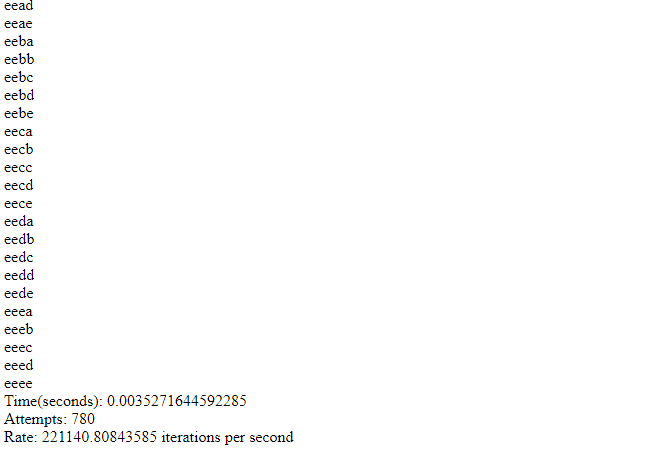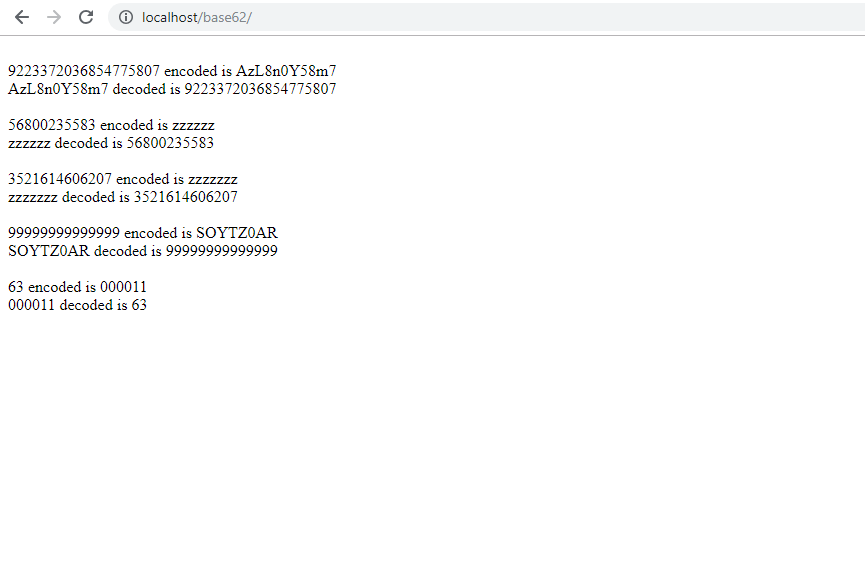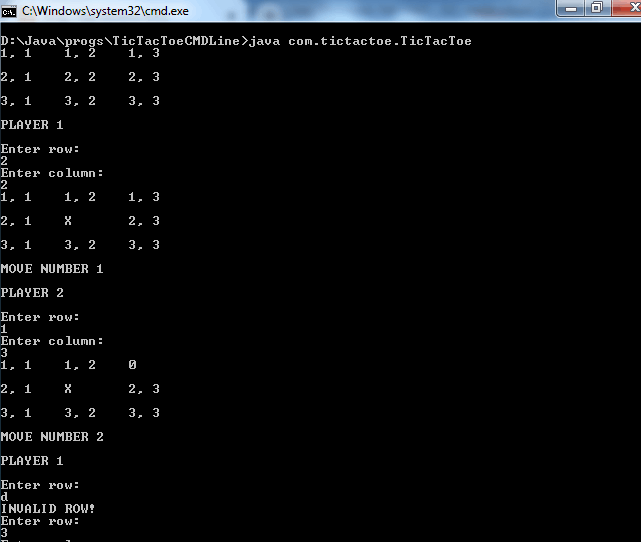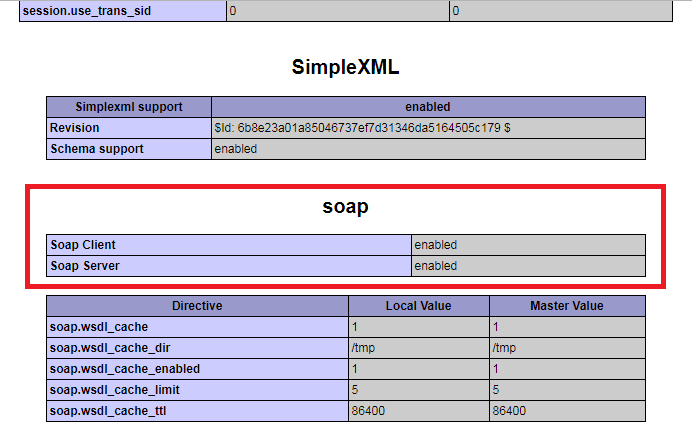I used a brute force logic to develop an algorithm for tic-tac-toe.
Firstly, there are only 8 triads of winning points or moves: three vertical, three horizontal and 2 diagonals.
Players play taking turns or making moves alternately. Player 1 makes a maximum of 5 moves and player
2 makes a maximum of 4 moves because there are a maximum of 9 moves to be made and player 1 begins the game.
Furthermore, player 1 has already made 2 moves before getting his first chance to form a winning line.
Players take turns alternately which means that when player 1 gets his first chance to form a line,
player 2 has already made 2 moves of his own. So player 1 can only form a line from move 5. Player 2
can only form his first line at move 6. Player 1 gets his second chance to win at move 7 and his third
and last chance at move 9. Similarly, player 2 gets his second and last chance at move 8.
Every time there is a chance to form a winning line, all possible permutations and combinations of
the current players moves, taken three at a time, are compared with all 8 winning triads. If a match is found,
the current player wins. If player 1 forms a line first, player 2 does not get a chance to continue the game.
The game has 3 versions: PHP, Java and C#
PHP Version
It can be played via the command-line executable of your PHP installation.
In the game of tic-tac-toe there is a 3X3 grid or board.The game is for two players. The players 1 and 2 take turns to mark the cells of the grid with their mark which is a zero or a cross.
The first player to complete a vertical, horizontal or diagonal triad of zeroes or crosses, wins.
In this implementation, I have used the OOPs or Object Oriented Programming features of PHP.
I have divided the functionality and roles or responsibilities between various classes as follows.
Player makes Move on Board to play Game. So the classes are:
- Move
- Board
- Player
- Game
First we discuss the move class:
Move:
Move made by either of the players.
class Move
{
private $row; // between 1 and 3
private $column; //between 1 and 3 on the 3x3 board
private $isValid; //whether the move is valid or not
//getters and setters for the properties
public function setRow($i)
{
$this->row = $i;
}
public function setColumn($j)
{
$this->column = $j;
}
public function setValid($valid)
{
$this->isValid = $valid;
}
public function getRow()
{
return $this->row;
}
public function getColumn()
{
return $this->column;
}
public function getValid()
{
return $this->isValid;
}
}
Then comes the Board class where the moves are made.
Board:
The board on which the game is played.
class Board
{
private $cells = array(); //the 3x3 grid of cells
public function __construct()
{
$row1 = array(" ", " ", " ");
$row2 = array(" ", " ", " ");
$row3 = array(" ", " ", " ");
$this->cells[0] = $row1;
$this->cells[1] = $row2;
$this->cells[2] = $row3;
}
//display the board with moves made so far
public function display()
{
for($i = 0; $i < 3; $i++)
{
for($j = 0; $j < 3; $j++) { if($this->cells[$i][$j] == " ")
{
echo ($i + 1).", ".($j + 1)."\t";
}
else
{
echo $this->cells[$i][$j]."\t";
}
}
echo "\n\n";
}
}
//check if a cell is already occupied or not
public function checkAvailable($move)
{
$i = $move->getRow();
$j = $move->getColumn();
$valid1 = (($i >= 1 && $i <= 3) && ($j >= 1 && $j <= 3));
if($valid1)
{
$valid2 = ($this->cells[$i - 1][$j - 1] == " ");
}
else
{
$valid2 = false;
}
$valid3 = ($valid1 && $valid2);
$move->setValid($valid3);
return $move;
}
//put a cross or zero in a cell if the move is valid
public function markCell($move, $mark)
{
if($move->getValid())
{
$i = $move->getRow();
$j = $move->getColumn();
$this->cells[$i - 1][$j - 1] = $mark;
}
else
{
echo "INVALID MOVE!\n\n";
}
}
}
The Player class denotes the players who make moves on the board.
Player:
Either of the two players.
class Player
{
private $playerNum; //player 1 or 2
private $playerMark; // '0' or 'X'
private $winnerOrLoser;
private $moves = array(); //list of moves made by player
private $g; //the game being played
//getters and setters
public function setPlayerNum($num)
{
$this->playerNum = $num;
}
public function setPlayerMark($mark)
{
$this->playerMark = $mark;
}
public function setPlayerWinnerLoser($winnerOrLoser)
{
$this->winnerOrLoser = $winnerOrLoser;
}
public function getPlayerNum()
{
return $this->playerNum;
}
public function getPlayerMark()
{
return $this->playerMark;
}
public function getPlayerWinLose()
{
return $this->winnerOrLoser;
}
public function getPlayerMoves()
{
return $this->moves;
}
//the player can put x or 0 by choosing the cell (row and column)
public function makeMove($board, $move)
{
$move = $board->checkAvailable($move);
$mark = $this->getPlayerMark();
$board->markCell($move, $mark);
if($move->getValid())
{
$this->addMove($move);
$this->getGame()->setMovesTillNow();
}
$board->display();
}
//if move is valid, add the move to the player's list of moves
public function addMove($move)
{
$this->moves[] = $move;
}
public function setGame($game)
{
$this->g = $game;
}
public function getGame()
{
return $this->g;
}
}
The Game class is the functionality of the game with all its rules.
Game:
The game being played.
class Game
{
private $whoseTurn; //player 1 or 2
private static $movesTillNow = 0; //how many moves till now
private $gameOver; //is game over yet?
private $winningMoves; //list of combination of moves which can win the game
private $winner = null;
private $winning_moves;
public function __construct()
{
//winning moves
$this->winning_moves = array();
//row wise
$move01 = new Move();
$move01->setRow(1);
$move01->setColumn(1);
$move02 = new Move();
$move02->setRow(1);
$move02->setColumn(2);
$move03 = new Move();
$move03->setRow(1);
$move03->setColumn(3);
$move0 = array($move01, $move02, $move03);
$this->winning_moves[0] = $move0;
$move11 = new Move();
$move11->setRow(2);
$move11->setColumn(1);
$move12 = new Move();
$move12->setRow(2);
$move12->setColumn(2);
$move13 = new Move();
$move13->setRow(2);
$move13->setColumn(3);
$move1 = array($move11, $move12, $move13);
$this->winning_moves[1] = $move1;
$move21 = new Move();
$move21->setRow(3);
$move21->setColumn(1);
$move22 = new Move();
$move22->setRow(3);
$move22->setColumn(2);
$move23 = new Move();
$move23->setRow(3);
$move23->setColumn(3);
$move2 = array($move21, $move22, $move23);
$this->winning_moves[2] = $move2;
//column wise
$move31 = new Move();
$move31->setRow(1);
$move31->setColumn(1);
$move32 = new Move();
$move32->setRow(2);
$move32->setColumn(1);
$move33 = new Move();
$move33->setRow(3);
$move33->setColumn(1);
$move3 = array($move31, $move32, $move33);
$this->winning_moves[3] = $move3;
$move41 = new Move();
$move41->setRow(1);
$move41->setColumn(2);
$move42 = new Move();
$move42->setRow(2);
$move42->setColumn(2);
$move43 = new Move();
$move43->setRow(3);
$move43->setColumn(2);
$move4 = array($move41, $move42, $move43);
$this->winning_moves[4] = $move4;
$move51 = new Move();
$move51->setRow(1);
$move51->setColumn(3);
$move52 = new Move();
$move52->setRow(2);
$move52->setColumn(3);
$move53 = new Move();
$move53->setRow(3);
$move53->setColumn(3);
$move5 = array($move51, $move52, $move53);
$this->winning_moves[5] = $move5;
//diagonally
$move61 = new Move();
$move61->setRow(1);
$move61->setColumn(1);
$move62 = new Move();
$move62->setRow(2);
$move62->setColumn(2);
$move63 = new Move();
$move63->setRow(3);
$move63->setColumn(3);
$move6 = array($move61, $move62, $move63);
$this->winning_moves[6] = $move6;
$move71 = new Move();
$move71->setRow(1);
$move71->setColumn(3);
$move72 = new Move();
$move72->setRow(2);
$move72->setColumn(2);
$move73 = new Move();
$move73->setRow(3);
$move73->setColumn(1);
$move7 = array($move71, $move72, $move73);
$this->winning_moves[7] = $move7;
}
//getters and setters
public function getWhoseTurn()
{
return $this->whoseTurn;
}
public function setWhoseTurn($player)
{
$this->whoseTurn = $player->getPlayerNum();
}
public function getGameOver()
{
return $this->gameOver;
}
public function setGameOver($gameOver)
{
$this->gameOver = $gameOver;
}
public function setMovesTillNow()
{
self::$movesTillNow++;
}
public function getMovesTillNow()
{
return self::$movesTillNow;
}
public function setWinner($winner)
{
$this->winner = $winner;
}
public function getWinner()
{
return $this->winner;
}
//check if winning moves have been made by either player
public function checkWinningMoves($player)
{
$movesTillNow = $this->getMovesTillNow();
$whoseTurn = $this->getWhoseTurn();
$playerMoves = $player->getPlayerMoves();
$moves = $movesTillNow;
$winning_moves1 = $this->winning_moves;
switch($whoseTurn)
{
case 1:
if($moves < 5)
{
return false;
}
else
{
if($moves == 5)
{
$player1_set1 = array($playerMoves[0], $playerMoves[1], $playerMoves[2]);
for($i = 0; $i < 8; $i++) { if($this->checkSubset($player1_set1, $winning_moves1[$i]))
{
return true;
}
}
}
if($moves == 7)
{
$player1_set2 = array($playerMoves[0], $playerMoves[1], $playerMoves[3]);
$player1_set4 = array($playerMoves[0], $playerMoves[2], $playerMoves[3]);
$player1_set7 = array($playerMoves[1], $playerMoves[2], $playerMoves[3]);
for($i = 0; $i < 8; $i++) { if($this->checkSubset($player1_set2, $winning_moves1[$i]) ||
$this->checkSubset($player1_set4, $winning_moves1[$i]) ||
$this->checkSubset($player1_set7, $winning_moves1[$i]) )
{
return true;
}
}
}
if($moves == 9)
{
$player1_set3 = array($playerMoves[0], $playerMoves[1], $playerMoves[4]);
$player1_set5 = array($playerMoves[0], $playerMoves[2], $playerMoves[4]);
$player1_set6 = array($playerMoves[0], $playerMoves[3], $playerMoves[4]);
$player1_set8 = array($playerMoves[1], $playerMoves[2], $playerMoves[4]);
$player1_set9 = array($playerMoves[1], $playerMoves[3], $playerMoves[4]);
$player1_set10 = array($playerMoves[2], $playerMoves[3], $playerMoves[4]);
for($i = 0; $i < 8; $i++) { if($this->checkSubset($player1_set3, $winning_moves1[$i]) ||
$this->checkSubset($player1_set5, $winning_moves1[$i]) || $this->checkSubset($player1_set6, $winning_moves1[$i]) ||
$this->checkSubset($player1_set8, $winning_moves1[$i]) || $this->checkSubset($player1_set9, $winning_moves1[$i]) ||
$this->checkSubset($player1_set10, $winning_moves1[$i]))
{
return true;
}
}
}
return false;
}
break;
case 2:
if($moves < 6)
{
return false;
}
else
{
if($moves == 6)
{
$player2_set1 = array($playerMoves[0], $playerMoves[1], $playerMoves[2]);
for($i = 0; $i < 8; $i++) { if($this->checkSubset($player2_set1, $winning_moves1[$i]))
{
return true;
}
}
}
if($moves == 8)
{
$player2_set2 = array($playerMoves[0], $playerMoves[1], $playerMoves[3]);
$player2_set3 = array($playerMoves[0], $playerMoves[2], $playerMoves[3]);
$player2_set4 = array($playerMoves[1], $playerMoves[2], $playerMoves[3]);
for($i = 0; $i < 8; $i++) { if($this->checkSubset($player2_set2, $winning_moves1[$i]) || $this->checkSubset($player2_set3, $winning_moves1[$i]) ||
$this->checkSubset($player2_set4, $winning_moves1[$i]))
{
return true;
}
}
}
return false;
}
break;
default:
return false;
}
}
//check if player moves match the winning sequence
private function checkSubset($subset, $winning_row)
{
$count = 0;
for($i = 0; $i < 3; $i++)
{
for($j = 0; $j < 3; $j++) { if($subset[$i]->getRow() == $winning_row[$j]->getRow() && $subset[$i]->getColumn() == $winning_row[$j]->getColumn())
{
$count++;
}
}
}
return ($count == 3);
}
}
Putting it all together.
<?php
require("includes/move.php"); //the Move class
require("includes/player.php"); //the Player class
require("includes/board.php"); //the Board class
require("includes/game.php"); //the Game class
function main() //where all the action is
{
$game = new Game();
$player1 = new Player();
$player1->setPlayerNum(1);
$player1->setPlayerMark('X');
$player1->setGame($game);
$player2 = new Player();
$player2->setPlayerNum(2);
$player2->setPlayerMark('0');
$player2->setGame($game);
$b = new Board();
$b->display();
$game->setWhoseTurn($player1);
$game->setGameOver(false);
$status = $game->getGameOver();
do
{
$movesNow = $game->getMovesTillNow();
if($movesNow == 9)
{
if($game->getWinner() == null)
{
echo "TIE!";
break;
}
}
$turn = $game->getWhoseTurn();
echo "PLAYER $turn:\n\n";
$row = 0; $column = 0;
echo "Enter row: ";
trim(fscanf(STDIN, "%d\n", $row));
echo "Enter column: ";
trim(fscanf(STDIN, "%d\n", $column));
echo "\n";
$move = new Move();
$move->setRow($row);
$move->setColumn($column);
switch($turn)
{
case 1:
$player1->makeMove($b, $move);
if($game->checkWinningMoves($player1))
{
$game->setWinner($player1);
echo "PLAYER 1 WINS!\n\n";
$game->setGameOver(true);
}
else
{
if($move->getValid())
{
$movesNow = $game->getMovesTillNow();
echo "MOVE NUMBER: $movesNow\n\n";
$game->setWhoseTurn($player2);
}
}
break;
case 2:
$player2->makeMove($b, $move);
if($game->checkWinningMoves($player2))
{
$game->setWinner($player2);
echo "PLAYER 2 WINS!\n\n";
$game->setGameOver(true);
}
else
{
if($move->getValid())
{
$movesNow = $game->getMovesTillNow();
echo "MOVE NUMBER: $movesNow\n\n";
$game->setWhoseTurn($player1);
}
}
break;
default:
echo "ERROR!\n\n";
break;
}
$status = $game->getGameOver();
}while(!$status);
}
main(); //invoking the game play
?>
This implementation is not perfect by any means. Any suggestions for improvement are welcome. Screenshots given below:
Java Version
Here is an elementary tic-tac-toe or noughts and crosses game made in Java.
It can be played via the java interpreter from the command line. In the game of tic-tac-toe there is a 3X3 grid or board.The game is for two players. The players take turns to mark the cells of the grid with their mark which is a zero or a cross.
The first player to complete a vertical, horizontal or diagonal triad of zeroes or crosses, wins.
The PHP version can be found here
Player makes Move on Board to play Game. So the classes are:
- Move
- Board
- Player
- Game
- TicTacToe
There is one new class “TicTacToe” because Java needs a main class having the “main” method implemented in it.
The first four classes are in the package named “com.tictactoe.components” , while the main class is in the package named “com.tictactoe”.
First we discuss the move class:
Move:
Move made by either of the players.
package com.tictactoe.components;
/**
*
* @author pratyush
*/
public class Move {
private int row, column;
private boolean isValid;
public int getRow() {
return row;
}
public void setRow(int row) {
this.row = row;
}
public int getColumn() {
return column;
}
public void setColumn(int column) {
this.column = column;
}
public boolean isIsValid() {
return isValid;
}
public void setIsValid(boolean isValid) {
this.isValid = isValid;
}
}
Then comes the Board class where the moves are made.
Board:
The board on which the game is played.
package com.tictactoe.components;
/**
*
* @author pratyush
*/
public class Board{
private static char[][] cells;
public Board()
{
cells = new char[3][3];
cells[0] = new char[]{' ', ' ', ' '};
cells[1] = new char[]{' ', ' ', ' '};
cells[2] = new char[]{' ', ' ', ' '};
}
public void display()
{
for(int i = 0; i < 3; i++)
{
for(int j = 0; j < 3; j++) {
if(cells[i][j] == ' ') {
System.out.print((i+1)+", "+(j+1)+"\t");
} else {
System.out.print(cells[i][j]+"\t");
}
} System.out.print("\n\n");
}
}
public Move checkAvailable(Move move) {
int i = move.getRow();
int j = move.getColumn();
boolean boundValid = ((i >= 1 && i<= 3) && ( j >= 1 && j <= 3));
boolean charValid = false;
if(boundValid)
{
charValid = (cells[i - 1][j - 1] == ' ');
}
boolean netValid = (boundValid && charValid);
move.setIsValid(netValid);
return move;
}
public void markCell(Move move, char mark)
{
if(move.isIsValid())
{
int i = move.getRow();
int j = move.getColumn();
cells[i - 1][j - 1] = mark;
}
else
{
System.out.println("INVALID MOVE!\n\n");
}
}
}
The Player class denotes the players who make moves on the board.
Player:
Either of the two players.
package com.tictactoe.components;
import java.util.ArrayList;
/**
*
* @author pratyush
*/
public class Player {
private int playerNum;
private char playerMark;
private int winnerOrLoser;
private Game g;
private ArrayList<Move> moves = new ArrayList<Move>();
public int getPlayerNum() {
return playerNum;
}
public void setPlayerNum(int playerNum) {
this.playerNum = playerNum;
}
public char getPlayerMark() {
return playerMark;
}
public void setPlayerMark(char playerMark) {
this.playerMark = playerMark;
}
public int getWinnerOrLoser() {
return winnerOrLoser;
}
public void setWinnerOrLoser(int winnerOrLoser) {
this.winnerOrLoser = winnerOrLoser;
}
public Game getGame() {
return g;
}
public void setGame(Game g) {
this.g = g;
}
public ArrayList getMoves() {
return moves;
}
public void addMove(Move move) {
this.moves.add(move);
}
public void makeMove(Board board, Move move)
{
move = board.checkAvailable(move);
char mark = this.getPlayerMark();
board.markCell(move, mark);
if(move.isIsValid())
{
this.addMove(move);
Game.setMovesTillNow();
}
board.display();
}
}
The Game class is the functionality of the game with all its rules.
Game:
The game being played.
package com.tictactoe.components;
import java.util.ArrayList;
/**
*
* @author pratyush
*/
public class Game{
private int whoseTurn;
private static int movesTillNow = 0;
private boolean gameOver;
private Player winner = null;
Move[][] winning_moves;
public Game()
{
winning_moves = new Move[8][3];
//top row
Move move01 = new Move();
move01.setRow(1);
move01.setColumn(1);
Move move02 = new Move();
move02.setRow(1);
move02.setColumn(2);
Move move03 = new Move();
move03.setRow(1);
move03.setColumn(3);
Move[] move0;
move0 = new Move[]{move01, move02, move03};
winning_moves[0] = move0;
//middle row
Move move11 = new Move();
move11.setRow(2);
move11.setColumn(1);
Move move12 = new Move();
move12.setRow(2);
move12.setColumn(2);
Move move13 = new Move();
move13.setRow(2);
move13.setColumn(3);
Move[] move1;
move1 = new Move[]{move11, move12, move13};
winning_moves[1] = move1;
//bottom row
Move move21 = new Move();
move21.setRow(3);
move21.setColumn(1);
Move move22 = new Move();
move22.setRow(3);
move22.setColumn(2);
Move move23 = new Move();
move23.setRow(3);
move23.setColumn(3);
Move[] move2;
move2 = new Move[]{move21, move22, move23};
winning_moves[2] = move2;
//column wise
//column 1
Move move31 = new Move();
move31.setRow(1);
move31.setColumn(1);
Move move32 = new Move();
move32.setRow(2);
move32.setColumn(1);
Move move33 = new Move();
move33.setRow(3);
move33.setColumn(1);
Move[] move3;
move3 = new Move[]{move31, move32, move33};
winning_moves[3] = move3;
//column 2
Move move41 = new Move();
move41.setRow(1);
move41.setColumn(2);
Move move42 = new Move();
move42.setRow(2);
move42.setColumn(2);
Move move43 = new Move();
move43.setRow(3);
move43.setColumn(2);
Move[] move4;
move4 = new Move[]{move41, move42, move43};
winning_moves[4] = move4;
//column 3
Move move51 = new Move();
move51.setRow(1);
move51.setColumn(3);
Move move52 = new Move();
move52.setRow(2);
move52.setColumn(3);
Move move53 = new Move();
move53.setRow(3);
move53.setColumn(3);
Move[] move5;
move5 = new Move[]{move51, move52, move53};
winning_moves[5] = move5;
//diagonals
//diagonal 1
Move move61 = new Move();
move61.setRow(1);
move61.setColumn(1);
Move move62 = new Move();
move62.setRow(2);
move62.setColumn(2);
Move move63 = new Move();
move63.setRow(3);
move63.setColumn(3);
Move[] move6;
move6 = new Move[]{move61, move62, move63};
winning_moves[6] = move6;
//diagonal 2
Move move71 = new Move();
move71.setRow(1);
move71.setColumn(3);
Move move72 = new Move();
move72.setRow(2);
move72.setColumn(2);
Move move73 = new Move();
move73.setRow(3);
move73.setColumn(1);
Move[] move7;
move7 = new Move[]{move71, move72, move73};
winning_moves[7] = move7;
}
public int getWhoseTurn() {
return whoseTurn;
}
public void setWhoseTurn(Player player) {
this.whoseTurn = player.getPlayerNum();
}
public static int getMovesTillNow() {
return movesTillNow;
}
public static void setMovesTillNow() {
Game.movesTillNow++;
}
public boolean isGameOver() {
return gameOver;
}
public void setGameOver(boolean gameOver) {
this.gameOver = gameOver;
}
public Player getWinner() {
return winner;
}
public void setWinner(Player winner) {
this.winner = winner;
}
private boolean checkSubset(Move[] subset, Move[] winning_row)
{
int count = 0;
for(int i = 0;i < 3; i++)
{
for(int j = 0; j< 3; j++)
{
if(subset[i].getRow() == winning_row[j].getRow() && subset[i].getColumn() == winning_row[j].getColumn())
{
count++;
}
}
}
return (count == 3);
}
//check the winning moves
public boolean checkWinningMoves(Player player)
{
/*****check winning moves*****/
int movesTillNow = Game.getMovesTillNow();
int whoseTurn = this.getWhoseTurn();
ArrayList<Move> playerMoves = player.getMoves();
int moves = movesTillNow;
Move[][] winning_moves1 = this.winning_moves;
switch(whoseTurn)
{
case 1:
if(moves < 5)
{
return false;
}
else
{
if(moves == 5)
{
Move[] player1_set1 = new Move[]{playerMoves.get(0), playerMoves.get(1), playerMoves.get(2)};
for(int i = 0; i< 8; i++)
{
if(checkSubset(player1_set1, winning_moves1[i]))
{
return true;
}
}
}
/******/
if(moves == 7)
{
Move[] player1_set2 = new Move[]{playerMoves.get(0), playerMoves.get(1), playerMoves.get(3)};
Move[] player1_set4 = new Move[]{playerMoves.get(0), playerMoves.get(2), playerMoves.get(3)};
Move[] player1_set7 = new Move[]{playerMoves.get(1), playerMoves.get(2), playerMoves.get(3)};
for(int i = 0; i < 8; i++)
{
if(checkSubset(player1_set2, winning_moves1[i]) ||
checkSubset(player1_set4, winning_moves1[i]) ||
checkSubset(player1_set7, winning_moves1[i]) )
{
return true;
}
}
}
if(moves == 9)
{
Move[] player1_set3 = new Move[]{playerMoves.get(0), playerMoves.get(1), playerMoves.get(4)};
Move[] player1_set5 = new Move[]{playerMoves.get(0), playerMoves.get(2), playerMoves.get(4)};
Move[] player1_set6 = new Move[]{playerMoves.get(0), playerMoves.get(3), playerMoves.get(4)};
Move[] player1_set8 = new Move[]{playerMoves.get(1), playerMoves.get(2), playerMoves.get(4)};
Move[] player1_set9 = new Move[]{playerMoves.get(1), playerMoves.get(3), playerMoves.get(4)};
Move[] player1_set10 = new Move[]{playerMoves.get(2), playerMoves.get(3), playerMoves.get(4)};
for(int i = 0; i < 8; i++)
{
if(checkSubset(player1_set3, winning_moves1[i]) ||
checkSubset(player1_set5, winning_moves1[i]) || checkSubset(player1_set6, winning_moves1[i]) ||
checkSubset(player1_set8, winning_moves1[i]) || checkSubset(player1_set9, winning_moves1[i]) ||
checkSubset(player1_set10, winning_moves1[i]))
{
return true;
}
}
}
return false;
}
case 2:
/******/
if(moves < 6)
{
return false;
}
else
{
/*******/
if(moves == 6)
{
Move[] player2_set1 = new Move[]{playerMoves.get(0), playerMoves.get(1), playerMoves.get(2)};
for(int i = 0; i < 8; i++)
{
if(checkSubset(player2_set1, winning_moves1[i]))
{
return true;
}
}
}
if(moves == 8)
{
Move[] player2_set2 = new Move[]{playerMoves.get(0), playerMoves.get(1), playerMoves.get(3)};
Move[] player2_set3 = new Move[]{playerMoves.get(0), playerMoves.get(2), playerMoves.get(3)};
Move[] player2_set4 = new Move[]{playerMoves.get(1), playerMoves.get(2), playerMoves.get(3)};
for(int i = 0; i < 8; i++)
{
if(checkSubset(player2_set2, winning_moves1[i]) || checkSubset(player2_set3, winning_moves1[i]) ||
checkSubset(player2_set4, winning_moves1[i]))
{
return true;
}
}
}
return false;
}
default:
return false;
}
}
}
Finally, the main class:
TicTacToe
The class containing the entry point of the program also called the main class.
package com.tictactoe;
import com.tictactoe.components.*;
import java.util.Scanner;
/**
*
* @author pratyush
*/
public class TicTacToe{
/**
* @param args the command line arguments
*/
public static void main(String[] args) {
// TODO code application logic here
Game game = new Game();
Player player1 = new Player();
player1.setPlayerNum(1);
player1.setPlayerMark('X');
player1.setGame(game);
Player player2 = new Player();
player2.setPlayerNum(2);
player2.setPlayerMark('0');
player2.setGame(game);
Board board = new Board();
board.display();
/*******/
game.setWhoseTurn(player1);
game.setGameOver(false);
boolean status = game.isGameOver();
Scanner sc = new Scanner(System.in);
do
{
int movesNow = Game.getMovesTillNow();
if(movesNow == 9)
{
if(game.getWinner() == null)
{
System.out.println("TIE!\n");
break;
}
}
int turn = game.getWhoseTurn();
System.out.println("PLAYER "+turn+"\n");
int row = 0;
int column = 0;
boolean invalid = true;
while(invalid)
{
//code to handle invalid moves. players cannot proceed without valid input
try{
System.out.println("Enter row: ");
String str = sc.next();
if(!str.equals(""))
{
row = Integer.parseInt(str);
invalid = false;
}
else
{
continue;
}
}
catch(NumberFormatException n)
{
System.out.println("INVALID ROW!");
invalid = true;
}
catch(InputMismatchException i)
{
System.out.println("INVALID ROW!");
invalid = true;
}
}
invalid = true;
while(invalid)
{
/*code to handle invalid moves. players cannot proceed without valid input*/
try{
System.out.println("Enter column: ");
String str = sc.next();
if(!str.equals(""))
{
column = Integer.parseInt(str);
invalid = false;
}
else
{
continue;
}
}
catch(NumberFormatException n)
{
System.out.println("INVALID COLUMN!");
invalid = true;
}
catch(InputMismatchException i)
{
System.out.println("INVALID COLUMN!");
invalid = true;
}
}
/**/
Move move = new Move();
move.setRow(row);
move.setColumn(column);
switch(turn)
{
case 1:
player1.makeMove(board, move);
if(game.checkWinningMoves(player1))
{
game.setWinner(player1);
System.out.println("PLAYER 1 WINS!");
game.setGameOver(true);
}
else
{
if(move.isIsValid())
{
movesNow = Game.getMovesTillNow();
System.out.println("MOVE NUMBER "+movesNow+"\n");
game.setWhoseTurn(player2);
}
}
break;
case 2:
player2.makeMove(board, move);
if(game.checkWinningMoves(player2))
{
game.setWinner(player2);
System.out.println("PLAYER 2 WINS!");
game.setGameOver(true);
}
else
{
if(move.isIsValid())
{
movesNow = Game.getMovesTillNow();
System.out.println("MOVE NUMBER "+movesNow+"\n");
game.setWhoseTurn(player1);
}
}
break;
default:
System.out.println("ERROR!\n");
break;
}
status = game.isGameOver();
}
while(!status);
}
}
Copy, Compile, Run and ENJOY!
C# version
Here is an elementary tic-tac-toe or noughts and crosses game I made in C#, arguably the most popular language of the DotNET platform. It can be played from the command line after compiling it as an executable. In the game of tic-tac-toe there is a 3X3 grid or board.The game is for two players. The players 1 and 2 take turns to mark the cells of the grid with their mark which is a zero or a cross.
The first player to complete a vertical, horizontal or diagonal triad of zeroes or crosses, wins.
The PHP version can be found here
Player makes Move on Board to play Game. So the classes are:
- Move
- Board
- Player
- Game
- TicTacToe
There is one new class “TicTacToe” because C# needs a main class having the “Main” method implemented in it.
The classes are in the namespace called “TicTacToeDotNet”.
First we discuss the move class:
Move:
Move made by either of the players.
using System;
using System.Collections.Generic;
using System.Linq;
using System.Text;
using System.Threading.Tasks;
namespace TicTacToeDotNet
{
public class Move
{
private int row, column;
private bool isValid;
public int getRow()
{
return row;
}
public void setRow(int row)
{
this.row = row;
}
public int getColumn()
{
return column;
}
public void setColumn(int column)
{
this.column = column;
}
public bool isIsValid()
{
return isValid;
}
public void setIsValid(bool isValid)
{
this.isValid = isValid;
}
}
}
Then comes the Board class where the moves are made.
Board:
The board on which the game is played.
using System;
using System.Collections.Generic;
using System.Linq;
using System.Text;
using System.Threading.Tasks;
namespace TicTacToeDotNet
{
public class Board
{
private static char[][] cells;
public Board()
{
cells = new char[3][];
cells[0] = new char[] { ' ', ' ', ' ' };
cells[1] = new char[] { ' ', ' ', ' ' };
cells[2] = new char[] { ' ', ' ', ' ' };
}
public void display()
{
for (int i = 0; i < 3; i++)
{
for (int j = 0; j < 3; j++) {
if (cells[i][j] == ' ') {
Console.Write((i + 1) + ", " + (j + 1) + "\t");
} else {
Console.Write(cells[i][j] + "\t");
}
} Console.Write("\n\n");
}
}
public Move checkAvailable(Move move) {
int i = move.getRow();
int j = move.getColumn();
bool boundValid = ((i >= 1 && i <= 3) && (j >= 1 && j <= 3));
bool charValid = false;
if (boundValid)
{
charValid = (cells[i - 1][j - 1] == ' ');
}
bool netValid = (boundValid && charValid);
move.setIsValid(netValid);
return move;
}
public void markCell(Move move, char mark)
{
if (move.isIsValid())
{
int i = move.getRow();
int j = move.getColumn();
cells[i - 1][j - 1] = mark;
}
else
{
Console.Write("INVALID MOVE!\n\n");
}
}
}
}
The Player class denotes the players who make moves on the board.
Player:
Either of the two players.
using System;
using System.Collections;
using System.Collections.Generic;
using System.Linq;
using System.Text;
using System.Threading.Tasks;
namespace TicTacToeDotNet
{
public class Player
{
private int playerNum;
private char playerMark;
private int winnerOrLoser;
private Game g;
private List moves = new List();
public int getPlayerNum()
{
return playerNum;
}
public void setPlayerNum(int playerNum)
{
this.playerNum = playerNum;
}
public char getPlayerMark()
{
return playerMark;
}
public void setPlayerMark(char playerMark)
{
this.playerMark = playerMark;
}
public int getWinnerOrLoser()
{
return winnerOrLoser;
}
public void setWinnerOrLoser(int winnerOrLoser)
{
this.winnerOrLoser = winnerOrLoser;
}
public Game getGame()
{
return g;
}
public void setGame(Game g)
{
this.g = g;
}
public List getMoves()
{
return moves;
}
public void addMove(Move move)
{
this.moves.Add(move);
}
public void makeMove(Board board, Move move)
{
move = board.checkAvailable(move);
char mark = this.getPlayerMark();
board.markCell(move, mark);
if (move.isIsValid())
{
this.addMove(move);
Game.setMovesTillNow();
}
board.display();
}
}
}
The Game class is the functionality of the game with all its rules.
Game:
The game being played.
using System;
using System.Collections.Generic;
using System.Linq;
using System.Text;
using System.Threading.Tasks;
namespace TicTacToeDotNet
{
public class Game
{
private int whoseTurn;
private static int movesTillNow = 0;
private bool gameOver;
private Player winner = null;
Move[][] winning_moves;
public Game()
{
winning_moves = new Move[8][];
//top row
Move move01 = new Move();
move01.setRow(1);
move01.setColumn(1);
Move move02 = new Move();
move02.setRow(1);
move02.setColumn(2);
Move move03 = new Move();
move03.setRow(1);
move03.setColumn(3);
Move[] move0;
move0 = new Move[] { move01, move02, move03 };
winning_moves[0] = move0;
//middle row
Move move11 = new Move();
move11.setRow(2);
move11.setColumn(1);
Move move12 = new Move();
move12.setRow(2);
move12.setColumn(2);
Move move13 = new Move();
move13.setRow(2);
move13.setColumn(3);
Move[] move1;
move1 = new Move[] { move11, move12, move13 };
winning_moves[1] = move1;
//bottom row
Move move21 = new Move();
move21.setRow(3);
move21.setColumn(1);
Move move22 = new Move();
move22.setRow(3);
move22.setColumn(2);
Move move23 = new Move();
move23.setRow(3);
move23.setColumn(3);
Move[] move2;
move2 = new Move[] { move21, move22, move23 };
winning_moves[2] = move2;
//column wise
//column 1
Move move31 = new Move();
move31.setRow(1);
move31.setColumn(1);
Move move32 = new Move();
move32.setRow(2);
move32.setColumn(1);
Move move33 = new Move();
move33.setRow(3);
move33.setColumn(1);
Move[] move3;
move3 = new Move[] { move31, move32, move33 };
winning_moves[3] = move3;
//column 2
Move move41 = new Move();
move41.setRow(1);
move41.setColumn(2);
Move move42 = new Move();
move42.setRow(2);
move42.setColumn(2);
Move move43 = new Move();
move43.setRow(3);
move43.setColumn(2);
Move[] move4;
move4 = new Move[] { move41, move42, move43 };
winning_moves[4] = move4;
//column 3
Move move51 = new Move();
move51.setRow(1);
move51.setColumn(3);
Move move52 = new Move();
move52.setRow(2);
move52.setColumn(3);
Move move53 = new Move();
move53.setRow(3);
move53.setColumn(3);
Move[] move5;
move5 = new Move[] { move51, move52, move53 };
winning_moves[5] = move5;
//diagonals
//diagonal 1
Move move61 = new Move();
move61.setRow(1);
move61.setColumn(1);
Move move62 = new Move();
move62.setRow(2);
move62.setColumn(2);
Move move63 = new Move();
move63.setRow(3);
move63.setColumn(3);
Move[] move6;
move6 = new Move[] { move61, move62, move63 };
winning_moves[6] = move6;
//diagonal 2
Move move71 = new Move();
move71.setRow(1);
move71.setColumn(3);
Move move72 = new Move();
move72.setRow(2);
move72.setColumn(2);
Move move73 = new Move();
move73.setRow(3);
move73.setColumn(1);
Move[] move7;
move7 = new Move[] { move71, move72, move73 };
winning_moves[7] = move7;
}
public int getWhoseTurn()
{
return whoseTurn;
}
public void setWhoseTurn(Player player)
{
this.whoseTurn = player.getPlayerNum();
}
public static int getMovesTillNow()
{
return movesTillNow;
}
public static void setMovesTillNow()
{
Game.movesTillNow++;
}
public bool isGameOver()
{
return gameOver;
}
public void setGameOver(bool gameOver)
{
this.gameOver = gameOver;
}
public Player getWinner()
{
return winner;
}
public void setWinner(Player winner)
{
this.winner = winner;
}
private bool checkSubset(Move[] subset, Move[] winning_row)
{
int count = 0;
for (int i = 0; i < 3; i++)
{
for (int j = 0; j < 3; j++)
{
if (subset[i].getRow() == winning_row[j].getRow() && subset[i].getColumn() == winning_row[j].getColumn())
{
count++;
}
}
}
return (count == 3);
}
//check the winning moves
public bool checkWinningMoves(Player player)
{
/*****check winning moves*****/
int movesTillNow = Game.getMovesTillNow();
int whoseTurn = this.getWhoseTurn();
Move[] playerMoves = player.getMoves().ToArray();
int moves = movesTillNow;
Move[][] winning_moves1 = this.winning_moves;
switch (whoseTurn)
{
case 1:
if (moves < 5)
{
return false;
}
else
{
if (moves == 5)
{
Move[] player1_set1 = new Move[] { playerMoves[0], playerMoves[1], playerMoves[2] };
for (int i = 0; i < 8; i++)
{
if (checkSubset(player1_set1, winning_moves1[i]))
{
return true;
}
}
}
/******/
if (moves == 7)
{
Move[] player1_set2 = new Move[] { playerMoves[0], playerMoves[1], playerMoves[3] };
Move[] player1_set4 = new Move[] { playerMoves[0], playerMoves[2], playerMoves[3] };
Move[] player1_set7 = new Move[] { playerMoves[1], playerMoves[2], playerMoves[3] };
for (int i = 0; i < 8; i++)
{
if (checkSubset(player1_set2, winning_moves1[i]) ||
checkSubset(player1_set4, winning_moves1[i]) ||
checkSubset(player1_set7, winning_moves1[i]))
{
return true;
}
}
}
if (moves == 9)
{
Move[] player1_set3 = new Move[] { playerMoves[0], playerMoves[1], playerMoves[4] };
Move[] player1_set5 = new Move[] { playerMoves[0], playerMoves[2], playerMoves[4] };
Move[] player1_set6 = new Move[] { playerMoves[0], playerMoves[3], playerMoves[4] };
Move[] player1_set8 = new Move[] { playerMoves[1], playerMoves[2], playerMoves[4] };
Move[] player1_set9 = new Move[] { playerMoves[1], playerMoves[3], playerMoves[4] };
Move[] player1_set10 = new Move[] { playerMoves[2], playerMoves[3], playerMoves[4] };
for (int i = 0; i < 8; i++)
{
if (checkSubset(player1_set3, winning_moves1[i]) ||
checkSubset(player1_set5, winning_moves1[i]) || checkSubset(player1_set6, winning_moves1[i]) ||
checkSubset(player1_set8, winning_moves1[i]) || checkSubset(player1_set9, winning_moves1[i]) ||
checkSubset(player1_set10, winning_moves1[i]))
{
return true;
}
}
}
return false;
}
case 2:
/******/
if (moves < 6)
{
return false;
}
else
{
/*******/
if (moves == 6)
{
Move[] player2_set1 = new Move[] { playerMoves[0], playerMoves[1], playerMoves[2] };
for (int i = 0; i < 8; i++)
{
if (checkSubset(player2_set1, winning_moves1[i]))
{
return true;
}
}
}
if (moves == 8)
{
Move[] player2_set2 = new Move[] { playerMoves[0], playerMoves[1], playerMoves[3] };
Move[] player2_set3 = new Move[] { playerMoves[0], playerMoves[2], playerMoves[3] };
Move[] player2_set4 = new Move[] { playerMoves[1], playerMoves[2], playerMoves[3] };
for (int i = 0; i < 8; i++)
{
if (checkSubset(player2_set2, winning_moves1[i]) || checkSubset(player2_set3, winning_moves1[i]) ||
checkSubset(player2_set4, winning_moves1[i]))
{
return true;
}
}
}
return false;
}
default:
return false;
}
}
}
}
Finally, the main class:
TicTacToe
The class containing the entry point of the program also called the main class.
using System;
using System.Collections.Generic;
using System.Linq;
using System.Text;
using System.Threading.Tasks;
namespace TicTacToeDotNet
{
public class TicTacToe
{
/**
* @param args the command line arguments
*/
public static void Main(string[] args)
{
// TODO code application logic here
Game game = new Game();
Player player1 = new Player();
player1.setPlayerNum(1);
player1.setPlayerMark('X');
player1.setGame(game);
Player player2 = new Player();
player2.setPlayerNum(2);
player2.setPlayerMark('0');
player2.setGame(game);
Board board = new Board();
board.display();
/*******/
game.setWhoseTurn(player1);
game.setGameOver(false);
bool status = game.isGameOver();
//
do
{
int movesNow = Game.getMovesTillNow();
if (movesNow == 9)
{
if (game.getWinner() == null)
{
Console.WriteLine("TIE!\n");
break;
}
}
int turn = game.getWhoseTurn();
Console.WriteLine("PLAYER " + turn + "\n");
int row = 0;
int column = 0;
bool invalid = true;
while (invalid)
{
//code to handle invalid moves. players cannot proceed without valid input
try
{
Console.WriteLine("Enter row: ");
string str = Convert.ToString(Console.ReadLine());
if (!(str == ""))
{
row = Convert.ToInt32(str);
invalid = false;
}
else
{
continue;
}
}
catch (FormatException n)
{
Console.WriteLine("INVALID ROW!");
invalid = true;
}
/**/
}
invalid = true;
while (invalid)
{
/*code to handle invalid moves. players cannot proceed without valid input*/
try
{
Console.WriteLine("Enter column: ");
String str = Convert.ToString(Console.ReadLine());
if (!(str == ""))
{
column = Convert.ToInt32(str);
invalid = false;
}
else
{
continue;
}
}
catch (FormatException n)
{
Console.WriteLine("INVALID COLUMN!");
invalid = true;
}
/**/
}
/**/
Move move = new Move();
move.setRow(row);
move.setColumn(column);
switch (turn)
{
case 1:
player1.makeMove(board, move);
if (game.checkWinningMoves(player1))
{
game.setWinner(player1);
Console.WriteLine("PLAYER 1 WINS!");
game.setGameOver(true);
}
else
{
if (move.isIsValid())
{
movesNow = Game.getMovesTillNow();
Console.WriteLine("MOVE NUMBER " + movesNow + "\n");
game.setWhoseTurn(player2);
}
}
break;
case 2:
player2.makeMove(board, move);
if (game.checkWinningMoves(player2))
{
game.setWinner(player2);
Console.WriteLine("PLAYER 2 WINS!");
game.setGameOver(true);
}
else
{
if (move.isIsValid())
{
movesNow = Game.getMovesTillNow();
Console.WriteLine("MOVE NUMBER " + movesNow + "\n");
game.setWhoseTurn(player1);
}
}
break;
default:
Console.WriteLine("ERROR!\n");
break;
}
status = game.isGameOver();
}
while (!status);
Console.Read();
}
}
}
Copy, Compile, Run and ENJOY!










 If your phpinfo() does not look like the screenshot above, you need to locate your php.ini file and uncomment the semi-colon in the lines containing the soap DLL file (php_soap.dll in Windows). Save the modified php.ini and restart Apache Server. Then check your phpinfo() again.
If your phpinfo() does not look like the screenshot above, you need to locate your php.ini file and uncomment the semi-colon in the lines containing the soap DLL file (php_soap.dll in Windows). Save the modified php.ini and restart Apache Server. Then check your phpinfo() again.